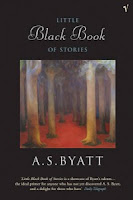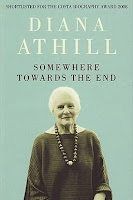 Have you ever noticed I generally start all of my reviews with some long, rambling introduction? Today will be no different.
Have you ever noticed I generally start all of my reviews with some long, rambling introduction? Today will be no different.
I’m reading about 4 different books right now (What Should I Do With My Life, The Law of Dreams, Slowing Down to the Speed of Life; can you sense a theme there?), including the only one I’ve finished so far, A.S. Byatt’s engaging short story collection, Little Black Book of Stories. Monday was spent in transit (doctor’s app’t, to and fro from work), which ensured I had a few spare moments to read (and by spare I mean an entire hour in the middle of the day waiting for the damn doctor).
We were at a birthday party this summer when the sister of a friend of mine was telling me the book that she had most enjoyed reading so far in 2009 was A.S. Byatt’s The Children’s Book. As I don’t have a copy that book in my possession, when I found this book just sitting on my shelf, I thought, “yes, that’s it for this week.” Because if you can’t have THE book why not at least try A book by one of the year’s most celebrated writers?
Comprised of five lengthy short stories, Byatt’s expansive imagination coupled with her never-ending quest to aptly describe human saddness (or longing, that might even be a better word), the book reminded me a little of Too Much Happiness. Every single character in the stories has been marred emotionally by their lives — happiness isn’t expected and nor is it gained. Life is rough, untidy, difficult and downright miserable in places. But because Byatt’s an exceptional writer, the undercurrents running through each story, the little bits of lives that exude joy, are there as well. She also has some lovely fantastical elements in each — the stories themselves tend a little toward fairy tales for adults.
My favourite of the five would have to be “Body Art”: an aging doctor released from an unhappy marriage but not his religious convictions finds himself entangled with a young (apparently almost-homeless) artist charged with “brightening” up the ward. Universal questions like how and why is art important to a life are, of course, raised, but the unlikely relationship between the two resonates even more. The central tale, “A Stone Woman,” has lovely fantastic elements, and “The Pink Ribbon” too — even if that story is achingly sad (it too reminded me of Munro, specifically, “The Bear Came Over the Mountain”).
On the whole, this collection was far more satisfying to read than Nocturnes. Because, holy cow, what a snoozer of a book that was.
READING CHALLENGES: Cleaning Out My Closet — a book from the dark corners of my bookshelf, for once. And because this book just feels so British (along with A.S. Byatt being born in England), I’m tagging it for Around the World in 52 Books too. My only reading challenge for next year? To keep up with all of my other reading challenges. Or maybe even finish one or two.








